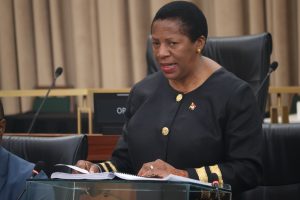Trinidad and Tobago is the seventh worst performing economy globally, according to data from the International Monetary Fund (IMF).
This revelation was made on Thursday by former Energy Minister Kevin Ramnarine during a United National Congress (UNC) Town Hall meeting at La Joya in St Joseph.
Ramnarine stated, “IMF data indicate that Trinidad and Tobago is the seventh worst performing economy in the world for the period 2016 to 2024. I obtained this information from a colleague at the university, whose name I won’t disclose to protect his identity, as he might face repercussions similar to those experienced by Dr Joel Teelucksingh.”
Paid political ad
He continued, “Naturally curious, I wanted to find out which countries rank ahead of us: number one is Venezuela, number two is South Sudan, and number three is Yemen. I believe the United States was recently planning to bomb Yemen; then there’s Sudan, which is different from South Sudan, followed by Equatorial Guinea, Lebanon, and finally, Trinidad and Tobago at number seven. Right behind us at number eight is Ukraine, a nation that has been under bombardment by Russia for the last three years.”
Ramnarine emphasized, “What these countries have in common with us is that they are all experiencing war, civil strife, and similar challenges. We are part of this troubling group. I want to clarify that this is IMF data, not my personal assessment, in light of potential press conferences from the opposing side.”
He noted, “The economic malaise is frustrating thousands of our bright young people who can’t find jobs. Many have left, and many will consider migration after April 28. Our loss of economic strength means that our country is not only losing its talented youth but also its leadership role and prestige in the Caribbean. The UK government has imposed a visa requirement on our citizens, which is a direct reflection of this decline. Central to this issue is a massive 31 percent drop in the energy sector since 2015, resulting from significant declines in gas and oil production. These reductions have led to plant closures, job losses, and the shuttering of companies; the evidence is overwhelming.”
He added that this decline partly contributed to the implementation of visa requirements for travel to the United Kingdom and the decrease in foreign exchange.
Ramnarine highlighted that back in 2015, there were 20,500 people employed in the energy sector, but by 2024, that number had decreased to 12,500.
He pointed out that since the People’s National Movement (PNM) came into power, foreign debt has doubled. “Our foreign debt has risen to US $5.6 billion,” he stated. “This means our foreign debt now exceeds our foreign reserves. The only thing standing between this country and economic disaster is the Heritage and Stabilisation Fund.”
He further explained, “This foreign exchange shortage is a direct consequence of decreased gas and oil production and petrochemical output, stemming from a collapse in drilling activities since 2015. Drilling activities have declined by about 55 percent; less drilling means less production.”
Ramnarine asserted that both former Prime Minister Dr. Keith Rowley and current Prime Minister Stuart Young have overseen the worst contraction in the country’s economy since the 1980s, with a contraction of approximately 20 percent. According to IMF data, Trinidad and Tobago is indeed the seventh worst performing economy in the world for the period 2016 to 2024.
He warned, “The issues surrounding the supply of foreign exchange to the public are not going to improve; they are only going to worsen. Our foreign reserves were $10.5 billion when we left office, and as of February 2025, that figure has dwindled to $5.3 billion.”
Ramnarine concluded that the $5.3 billion figure could have been even lower if not for foreign borrowings.
![]()














